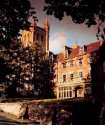STUDENT
GUIDE TO THE SIXTH FORM MATHEMATICS COURSES
The
AQA Mathematics Specification A course is
a two-year course, which aims to provide
a stimulating, enjoyable and ultimately rewarding
experience. We
offer Mathematics and Further Mathematics
at both the AS and A2 level. The
formal titles of the courses are:
AS
LEVEL MATHEMATICS
A2
LEVEL MATHEMATICS
AS
LEVEL FURTHER MATHEMATICS
A2
LEVEL FURTHER MATHEMATICS |
5301
6301
5311
6311 |
These
are examined by AQA. TOP
COURSE
STRUCTURE
MATHEMATICS
In
the first year of this A level course you
will study three modules, called ‘Methods’, ‘Pure
1’ and ‘Mechanics 1’, which
will lead to an AS in Mathematics. All
three modules will be sat in June as independent
1hour 20mins external examinations. The
Mechanics module also requires one piece
of coursework to be completed. This
piece of coursework comprises 10% of the
total AS mark. Every
module may be re-sat once, if required, but
the work will continue to pile up so try
to keep on top of each module.
In
the second year of the A level course you
will study three more modules, forming an
A2, which will result in you gaining the
full A level at the end of the two years. The
three modules are called ‘Pure 2’, ‘Pure
3’ and ‘Statistics 1’. The
Statistics module also requires one piece
of coursework to be completed, which comprises
10% of the total A2 mark.
You
will be taught throughout the one or two
years by two teachers. The ‘Methods’ module
will be split between the two teachers and
both parts will be completed before the end
of the Michaelmas term. You
will then study ‘Mechanics 1’ and ‘Pure
1’ at the same time, one module with
each teacher, to complete your AS level. The
course will be finished by the end of the
Lent term in order to allow sufficient time
for revision.
The
A2 course will follow a similar pattern with
one teacher guiding you through ‘Statistics
1’ while the other teaches you ‘Pure
2’. ‘Pure 3’ will then be split between the two teachers. TOP
FURTHER MATHEMATICS
The
Further Mathematics courses are organised
in a similar way but, with the smaller numbers
involved, can be tailored to some extent
in order to suit the individual.
The
AS course will comprise of three modules-‘Pure
6’, ‘Discrete 1’ and ‘Mechanics
2’. The
A2 will be made up of ‘Pure 4’, ‘Pure
5’ and one of either ‘Discrete
2’ or ‘Statistics 2’. The
Mechanics and Statistics modules require
one piece of coursework each.
A
BRIEF EXPLANATION OF THE MODULES
‘Pure
6’ involves the study of Matrices…..an
extension of the vector work that you met
at GCSE. Matrices
help us to solve problems involving a number
of variables – much quicker than solving
lots of simultaneous equations. There
is quite a bit of geometry involved as we
imagine transforming shapes in 3D.
‘Pure
5’ involves the study of Differential
Equations, which help us solve many practical
problems involving, for example, velocity
and rate of decay. This
module draws on the knowledge of Calculus
that you will develop in the Mathematics
AS and A2 courses. We
consider some Numerical Methods, looking
at the work of Euler, and worry about infinite
series.
‘Pure
4’ involves the study of Complex Numbers,
the ideas of proof and looks to calculate
the arc length of a curve and work with hyperbolic
functions. The
concepts of polar co-ordinates are explored….an
idea that is picked up in ‘Pure 5’ too.
Discrete
Mathematics considers the ‘quickest’ or ‘best’ way
of ordering a sequence of events or series
of tasks. It
develops the use of algorithms to solve problems. This
area of mathematics is widely used in industry
and we will look at ways of maximising profit
and matching the best person to a job. We
also meet Game Theory, which considers the
chances of winning a game. TOP
TEACHING ARRANGEMENTS
Written
assignments will usually be set twice a week
by each teacher, at least in the initial
stages, in order to ensure a smooth transition
from GCSE to A level. This
may develop into a once-weekly pattern a
little later in the course.
The
out-of-class work for each teacher should
constitute between two and three hours per
week; this may involve some written assignments,
some reading or some time allocated to personally
motivated study.
A
graphic calculator and a basic scientific
calculator are essential for these AS level
and A2 Mathematics course. We
recommend Casio machines and offer the opportunity
to buy through the school during the first
two weeks of the course.
There
are many formulae to learn over the two-year
course but, once we are confident that you
are familiar with the formulae and their
manipulation, formulae booklets are available
for tests and will be available in the examinations.
Each
term you will receive a syllabus for the
module you are embarking on and the dates
of any tests and coursework dates involved. The
intention is to give you every possible opportunity
to organise and structure your work in order
to maximise your potential. TOP
SUGGESTIONS
FOR A SUCCESSFUL TWO YEARS
-
Be
organised - divide your ring-binder in
to sections for each unit / teacher /
topic.
-
Start
a piece of work as soon as it has been
set and meet all deadlines.
-
Keep
well ahead and allow for unexpected delays
or problems, where possible.
-
Make
every effort with each piece of work
- stretch yourself mentally.
-
Go
over returned, marked work to see what
problems may still be lingering.
-
Always
be prepared to ask for help when you
think you may need it.
-
Let
us know of any problems that may be affecting
your work.
-
Take
an active part in the classroom.
-
Enjoy
it!
The
A level Mathematics course had proved increasingly
popular and we are now in the eighth year
of using what was the SMP 16-19 syllabus. |

